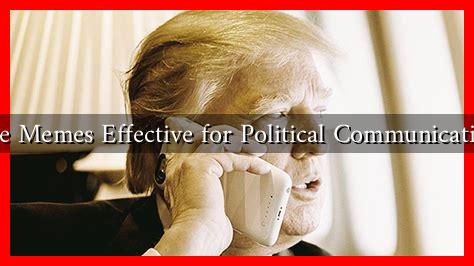-
Table of Contents
Are Memes Effective for Political Communication?
In the digital age, memes have emerged as a powerful tool for communication, particularly in the realm of politics. These humorous images, videos, or text snippets often convey complex ideas in a simplified manner, making them easily shareable and relatable. But how effective are memes in shaping political discourse? This article explores the role of memes in political communication, their impact on public opinion, and the implications for political campaigns.
The Rise of Memes in Political Discourse
Memes have become a staple of online culture, especially among younger demographics. Their rise can be attributed to several factors:
- Accessibility: With the proliferation of social media platforms, memes can be created and shared by anyone with internet access.
- Relatability: Memes often use humor and satire to address serious political issues, making them more relatable to the average person.
- Virality: The shareable nature of memes allows them to spread rapidly, reaching a wide audience in a short amount of time.
As a result, memes have become a significant part of political campaigns and discussions, influencing how voters perceive candidates and issues.
Memes as a Tool for Political Campaigns
Political campaigns have increasingly recognized the potential of memes to engage voters. For instance, during the 2016 U.S. presidential election, both major parties utilized memes to communicate their messages. The Trump campaign, in particular, was adept at using memes to energize its base and mock opponents. A notable example is the “Pepe the Frog” meme, which became associated with the alt-right movement and was used to convey a sense of rebellion against mainstream politics.
On the other hand, the Clinton campaign also employed memes, albeit with less success. The “I’m With Her” meme aimed to promote Hillary Clinton’s candidacy but failed to resonate as strongly as the memes produced by her opponent’s supporters.
The Impact of Memes on Public Opinion
Research indicates that memes can significantly influence public opinion. A study conducted by the University of Pennsylvania found that exposure to political memes can shape attitudes and beliefs about candidates and issues. The study revealed that:
- Memes can reinforce existing beliefs, making individuals more entrenched in their views.
- Humorous memes can lower resistance to political messages, making individuals more receptive to new ideas.
- Memes can create a sense of community among like-minded individuals, fostering group identity.
These findings suggest that memes are not just a form of entertainment; they can actively shape political landscapes and influence voter behavior.
Challenges and Ethical Considerations
While memes can be effective for political communication, they also pose challenges and ethical dilemmas:
- Misinformation: Memes can easily spread false information, leading to confusion and misinformed voters.
- Polarization: The humorous nature of memes can exacerbate political polarization, as individuals may only share memes that align with their beliefs.
- Oversimplification: Complex political issues may be oversimplified in memes, leading to a lack of nuanced understanding among the public.
These challenges highlight the need for critical engagement with political memes and a responsibility among creators to ensure accuracy and fairness.
Conclusion: The Future of Memes in Political Communication
In conclusion, memes have proven to be an effective tool for political communication, capable of engaging voters and shaping public opinion. Their accessibility, relatability, and viral nature make them a powerful medium in the digital age. However, the challenges associated with misinformation and polarization cannot be overlooked. As political communication continues to evolve, it is essential for both creators and consumers of memes to approach this medium with a critical eye. The future of political discourse may very well depend on how effectively we can harness the power of memes while mitigating their potential downsides.
For further reading on the impact of memes in politics, you can explore resources like Pew Research Center.

